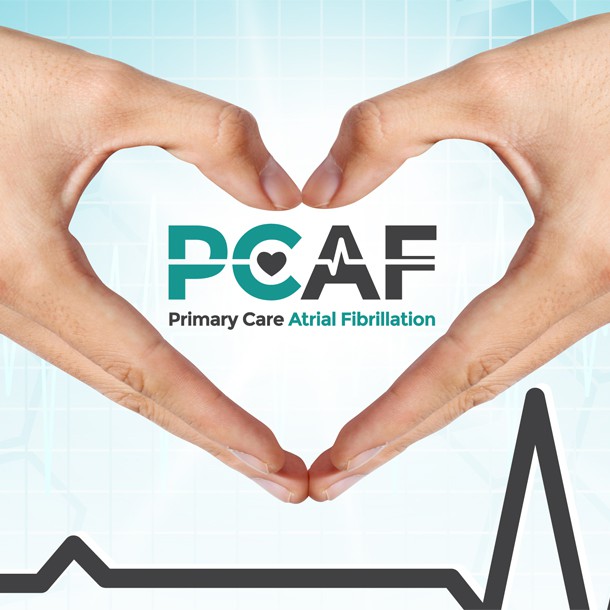Summary
Stroke risk associated with atrial fibrillation can be significantly reduced by appropriate preventative action. However, NICE estimate that 46% of patients who should be anticoagulated are not. The PCAF service is a pathway that provides expert resources within GP practices with the aim of improving anticoagulation among high-risk patients. To date, 42 GP practices have been enrolled, covering a population of 284,945. A total of 761 patients attending for review had anticoagulation offered, of whom 745 agreed. It is estimated about 30 strokes have been prevented.Challenge
Atrial fibrillation (AF) is a major risk factor for stroke. The risk of stroke can be significantly reduced by appropriate thromboembolic prophylaxis, and the recent release of three novel oral anticoagulant agents (NOACs) has expanded the therapeutic options. Despite this, the National Institute for Health and Care Excellence (NICE) estimates that 46 per cent of patients that should be anticoagulated are not.
A new approach was therefore needed. Hospital clinicians dealing regularly with AF and stroke patients are best-placed to initiate anticoagulation and to understand the therapeutic options, but the majority of these patients are not under review in secondary care. Secondary care expertise needed to be extended to the primary care setting.
Objectives
The primary objective of the Primary Care Atrial Fibrillation (PCAF) service is to utilise expert resources to improve the uptake of anticoagulation in AF patients at high risk of stroke within the primary care setting. To do so, a series goals needed to be met within each enrolled GP practice.
These included improving the accuracy of the practice AF register, to include all high-risk patients, assessing stroke risk in all AF patients, and identifying those with an elevated stroke risk. Other goals were to improve the invitation of patients for clinical review regarding anticoagulation, with as minimal a non-attendance rate as possible, and to provide consultant-led anticoagulation assessment clinics within the patients’ GP practice.
Solution
In the first phase of PCAF, the PRIMIS+ AF Query Case Finder Set scans the medical records of all practice patients not already on the AF register, identifying those with a potential AF. A PCAF professional reviews the notes of all identified patients, with the outcome: AF confirmed, does not have AF, or patient referred to diagnostics for further review.
In phase two, the GRASP-AF tool audits the revised AF register, identifying high-risk patients (CHA2DS2-VASc score ≥1) not on anticoagulation. TTR is assessed for all warfarinised patients.
Phase three sees a PCAF administrator send out invitation letters and information, then contacting patients by telephone one week and again one day prior to their appointment to minimise non-attendance.
In the final phase, PCAF antiocaogulation assessment clinics are delivered within the patients’ GP practice by a consultant cardiologist or consultant stroke physician. The patient’s treatment is reviewed and, where appropriate, anticoagulation prescribed.
Results
The PCAF pathway has been completed in 42 practices. In phase one, 5749 AF patients were found on their registers.
In phase two, 5426 patients (94 per cent) had a CHA2DS2-VASc score of ≥1, 56 per cent of them already on anticoagulation. Following case note reviews of 2106 of the remainder, 937 patients were found ineligible for anticoagulation. This left 1169 high-risk patients eligible for,but not, on anticoagulation.
In phase three, these 1169 patients were invited to PCAF anticoagulation clinics. All but three per cent attended.
Phase four saw 1014 patients (87 per cent) attend for review. Three quarters were confirmed to have AF and to be eligible for anticoagulation. Ninety-eight per cent of them agreed to commence anticoagulation.
Learnings
Managing anticoagulation involves decreasing thromboembolic events while reducing the risk of the haemorrhagic complications of the therapy. This is especially relevant in the primary care setting, where patients are frequently older, with more co-morbidities. The PCAF service has allowed secondary care physicians to appreciate this first-hand. Several patients have been identified via PCAF who have a genuine contraindication to oral anticoagulation, and many have gone on to receive alternative therapies.
PCAF identified several AF patients who were symptomatic enough to merit referral for specialised treatments. All healthcare professionals should offer AF patients a comprehensive package of care, including stroke prevention via oral anticoagulation, informing them of other therapeutic options that can improve their wellbeing and quality of life.
Evaluation
NICE and the Department of Health suggest that the number-needed-to-treat (NNT) with warfarin for one year to prevent one stroke in a mixed primary/secondary prevention group is 25. Based on this, the PCAF service may have prevented 29.8 strokes in the 745 high risk patients who have commenced anticoagulation. With the addition of the 67 patients previously on warfarin with a sub-optimal TTR now on a NOAC, more than 30 strokes have been prevented by PCAF.
Feedback is sought from both practice staff and patients on each phase of the service. PCAF recently introduced the AF-specific “Atrial Fibrillation Effect on Quality-of-Life” (AFEQT) patient questionnaire. This is completed by patients prior to and three months after the PCAF clinic.


QiC Anticoagulation Winner
Anticoagulation Innovation of the Year
Primary Care Atrial Fibrillation (PCAF) Service
by Inspira Health Solutions Ltd and Liverpool Heart and Chest Hospital
Contacts
Moloy Das
Job title: Research fellow
Place of work: Liverpool Heart and Chest Hospital
Email: moloy.das@lhch.nhs.uk


